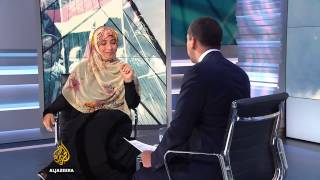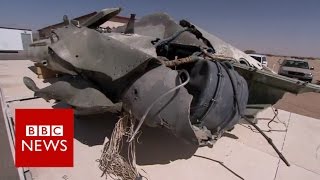Thursday, 15 January, 2026г.
















Где искать: по сайтам Запорожской области, статьи, видео ролики
пример: покупка автомобиля в Запорожье
Yemen's rial makes gains on back of calls for peace talks
(2 Dec 2018) Yemen's currency has made significant gains over the past two weeks on the back of the calls for peace talks between the country's warring parties.
But the change in the currency's value has yet to trickle down to the average citizen.
For much of the country's nearly four-year war, the Yemeni rial has been in a free-fall, causing skyrocketing prices for the most basic goods and putting much of the country at risk of hunger and starvation.
The rial has declined significantly since the war began, depreciating in black market trades, though official trading rates do not reflect the same disparity.
Before the conflict, the rial was 250 to the dollar.
Just earlier this month, Yemenis looking to buy dollars could pay close to 800 rials for the dollar.
But in the past two weeks, that rate has improved, and black market traders are selling dollars at a rate closer to 400 rials.
It remains to be seen whether the currency will stabilise at this level.
The country's Central Bank has essentially been split in two – making it difficult to manage the country's monetary policy and currency value.
In 2016, President Abed Rabbo Mansour Hadi, ordered the relocation of the country's central bank from the rebel-held capital Sanaa to the southern city of Aden, the seat of the internationally recognised government.
Since then, Saudi Arabia has propped the bank with contributions, giving the bank a 2 billion US dollar cash injection early this year.
But it was not enough to bolster the currency. The bank has struggled to keep its foreign reserves at a healthy level throughout the conflict.
The reasons for the latest recovery of the rial are unclear though the prospect of peace talks could be a factor, according to some analysts.
Meanwhile, the Houthi rebels maintain a central bank of their own in Sanaa, which they encourage citizens to contribute to in order to support the economy.
The conflict in Yemen began with the 2014 takeover of Sanaa by the Houthis, who toppled Hadi's government.
The Saudi-led coalition has been fighting the Houthis since March 2015.
Tens of thousands of people are believed to have been killed in the war and UN food agency chief David Beasley said last month that as many as 12 million of the 28 million Yemenis "are just one step away from famine."
Rising prices, not shortages, have prevented many Yemenis from purchasing enough food for their families.
Yemen largely depends on food imports so has been particularly susceptible to its currency value on international markets.
At a supermarket in Sanaa, there's no shortage of goods, but rather not enough people who can afford to buy them.
The store has recently cut some prices, but shoppers say that the markdowns are not enough, and almost everything on the shelves remains out of reach for anyone but the very wealthy.
"The fluctuating exchange rate has resulted in the suffering of the average citizen and we call on the United Nations to bring an end to the war," says Maad Mohamed, a wholesale trader.
Find out more about AP Archive: http://www.aparchive.com/HowWeWork
Twitter: https://twitter.com/AP_Archive
Facebook: https://www.facebook.com/APArchives
Google+: https://plus.google.com/b/102011028589719587178/+APArchive
Tumblr: https://aparchives.tumblr.com/
Instagram: https://www.instagram.com/APNews/
You can license this story through AP Archive: http://www.aparchive.com/metadata/youtube/cbb0bd75d15dc3e28f3ef4593758e81a
Теги:
AP Archive 4184878 cbb0bd75d15dc3e28f3ef4593758e81a Yemen Currency David Beasley Abd al-Rab Mansur al-Hadi Yemen Middle East Saudi Arabia Sanaa Government and politics Social affairs Business
Похожие видео
Мой аккаунт


 У вашего броузера проблема в совместимости с HTML5
У вашего броузера проблема в совместимости с HTML5


